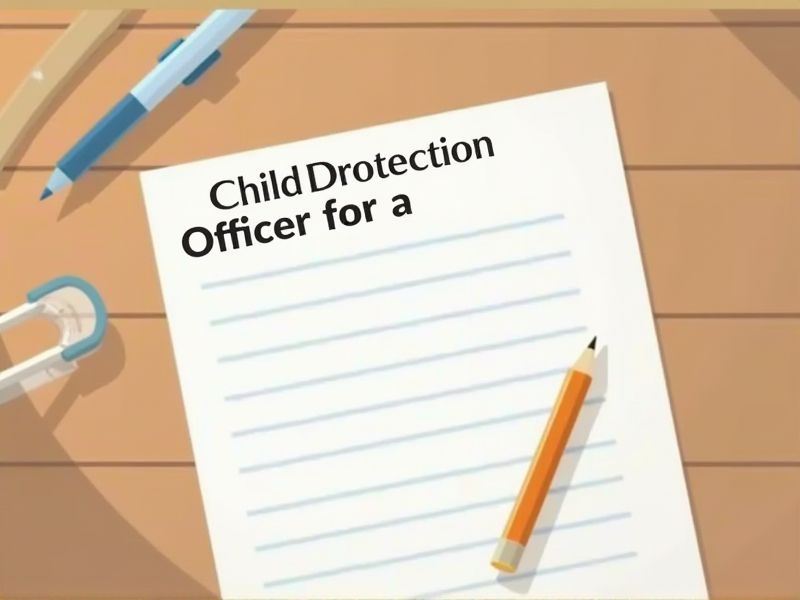
Child Protection Officers play a crucial role in ensuring the safety and well-being of children, especially within charitable organizations that may encounter a broad array of cases. Certifications provide them with the necessary skills and knowledge to handle sensitive situations effectively and ethically. These credentials also establish a standardized level of competence, which is critical for maintaining the trust and credibility of the organization. Some essential certifications you may need as a Child Protection Officer for a charitable organization.
Child Protection Practitioner Certification
Child Protection Practitioner Certification ensures that a Child Protection Officer possesses the necessary skills to adequately support at-risk children. This certification validates the officer's knowledge of safeguarding protocols, reducing the risk of harm due to improper handling. Certified officers are better equipped to handle complex cases involving vulnerable children, enhancing the organization's credibility. The certification assures donors and stakeholders of the charity's commitment to professional and ethical standards in child protection.
Child Abuse Recognition and Reporting Certification
Child abuse recognition and reporting certification equips Child Protection Officers with essential skills to identify signs of abuse, ensuring timely intervention. Certification promotes adherence to legal obligations, decreasing the organization's risk of liability. It fosters a safer environment for children by enforcing standardized reporting protocols. The training builds trust with stakeholders, reinforcing the organization's commitment to child welfare.
Safeguarding Vulnerable Children Certification
Safeguarding Vulnerable Children Certification equips a Child Protection Officer with essential skills to identify and respond to signs of child abuse or neglect. This certification demonstrates a commitment to maintaining a safe environment, which is crucial for maintaining trust with donors and the community. Having certified personnel ensures compliance with legal and organizational safety standards, reducing potential legal liabilities. Training in safeguarding also enhances the organization's reputation, attracting more support and resources for their cause.
Trauma-Informed Care Certification
Trauma-Informed Care Certification equips child protection officers with essential skills to recognize and respond to trauma in children effectively. Understanding trauma's impacts enhances their ability to create supportive environments that facilitate healing and recovery. Certification promotes consistency in care approaches, ensuring the organization meets standardized practices that prioritize child welfare. The credibility and knowledge gained enhance the organization's trust within the community, promoting better collaboration and outcomes.
Mandatory Reporting Training Certification
Mandatory Reporting Training Certification equips Child Protection Officers with comprehensive knowledge of legal obligations, ensuring appropriate response to suspected abuse cases. Certification increases awareness and accuracy in identifying signs of child abuse, enhancing protection for vulnerable children. It establishes a standardized approach across the organization, promoting consistency in reporting and intervention strategies. Training bolsters credibility and trust with stakeholders, demonstrating a commitment to child safety and welfare.
Child Rights and Policy Development Certification
Child Rights and Policy Development Certification equips Child Protection Officers with a deep understanding of legal frameworks that safeguard children. This knowledge ensures they can advocate effectively for children's rights within the organization. Certification provides standardized training, reducing the risk of oversight or improper intervention. Charitable organizations benefit from having officers who can align their operations with global best practices in child protection.
Pediatric First Aid and CPR Certification
Pediatric First Aid and CPR Certification equips Child Protection Officers with the necessary skills to respond effectively to emergencies involving children, thereby enhancing child safety in charitable environments. In situations of medical distress, the officer's ability to administer first aid can reduce the risk of severe outcomes for affected children. Organizations benefit by demonstrating a commitment to child welfare standards, attracting support from stakeholders concerned with child safety. Certification ensures that officers are better prepared to handle unforeseen incidents, thus fostering a safer environment for children under the organization's care.
Crisis Intervention Strategies Certification
Obtaining Crisis Intervention Strategies Certification equips child protection officers with vital skills to manage emergencies involving vulnerable children effectively. This certification ensures officers can identify and mitigate potential risks, enhancing child safety within charitable organizations. Trained officers are better prepared to handle high-stress situations, fostering a supportive environment for children in distress. The certification also promotes trust and credibility, which can strengthen the organization's reputation and effectiveness in serving at-risk children.
Cultural Competency in Child Protection Certification
Cultural competency in child protection certification equips officers with the necessary skills to understand diverse cultural backgrounds, leading to more effective communication and trust-building with families. It ensures that child protection strategies are respectful and appropriate for different cultural contexts, reducing the risk of misinterpretation and bias. By recognizing and addressing cultural differences, officers can make more informed decisions, enhancing the accuracy of risk assessments. This certification helps in creating inclusive and equitable child protection services, aligning with the mission of a charitable organization dedicated to serving diverse communities.
Mental Health First Aid for Youth Certification
Mental Health First Aid for Youth Certification equips Child Protection Officers with the skills to recognize and respond to signs of mental health issues in children, enhancing their capability to provide timely support. This certification fosters a deeper understanding of the unique challenges faced by young individuals, improving the officer's ability to manage situations empathetically and effectively. With mental health issues often underlying many child welfare cases, certified officers can identify potential risks and intervene before problems escalate. Training ensures that the organization demonstrates a commitment to holistic child protection, aligning with best practices and increasing trust among donors and community stakeholders.
Summary
You may develop a deeper trust in the Child Protection Officer's ability to safeguard vulnerable children once they acquire certifications. The organization can expect increased credibility and enhanced funding opportunities, as donors often prefer certified professionals. These certifications can result in improved protective strategies and adherence to legal standards in child welfare. Staff morale might improve, knowing that a certified individual leads their protection initiatives.
